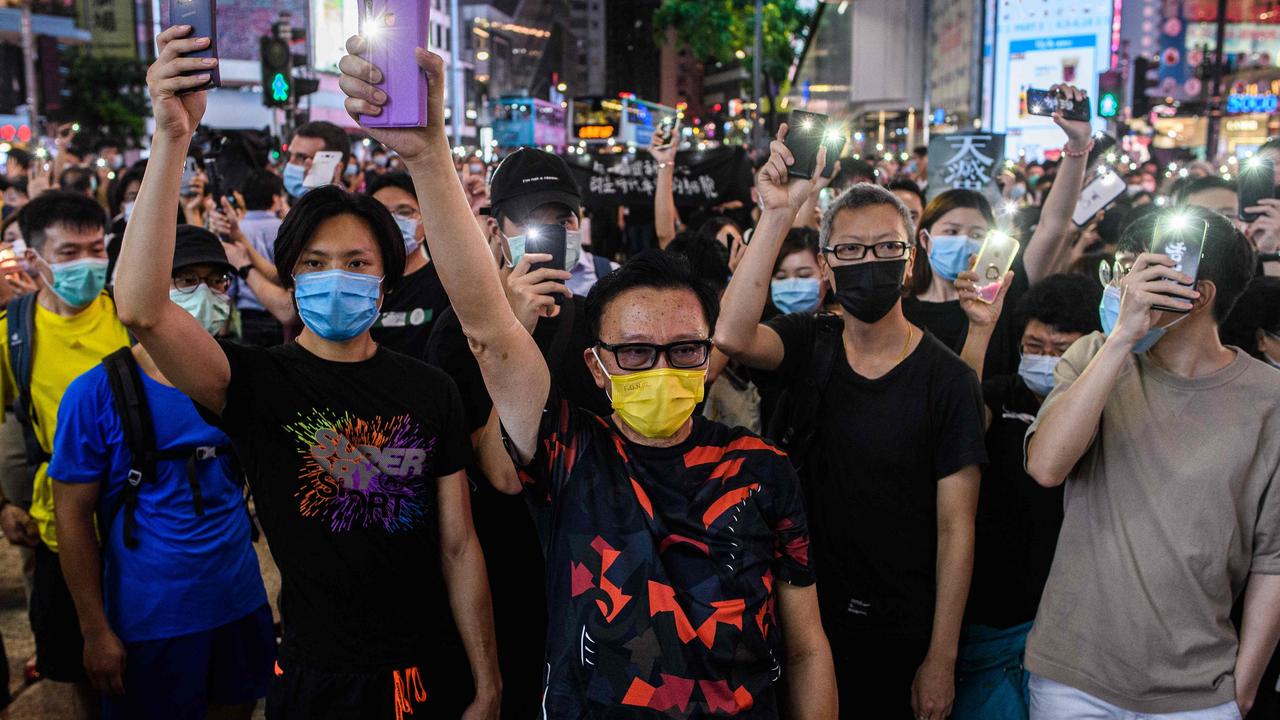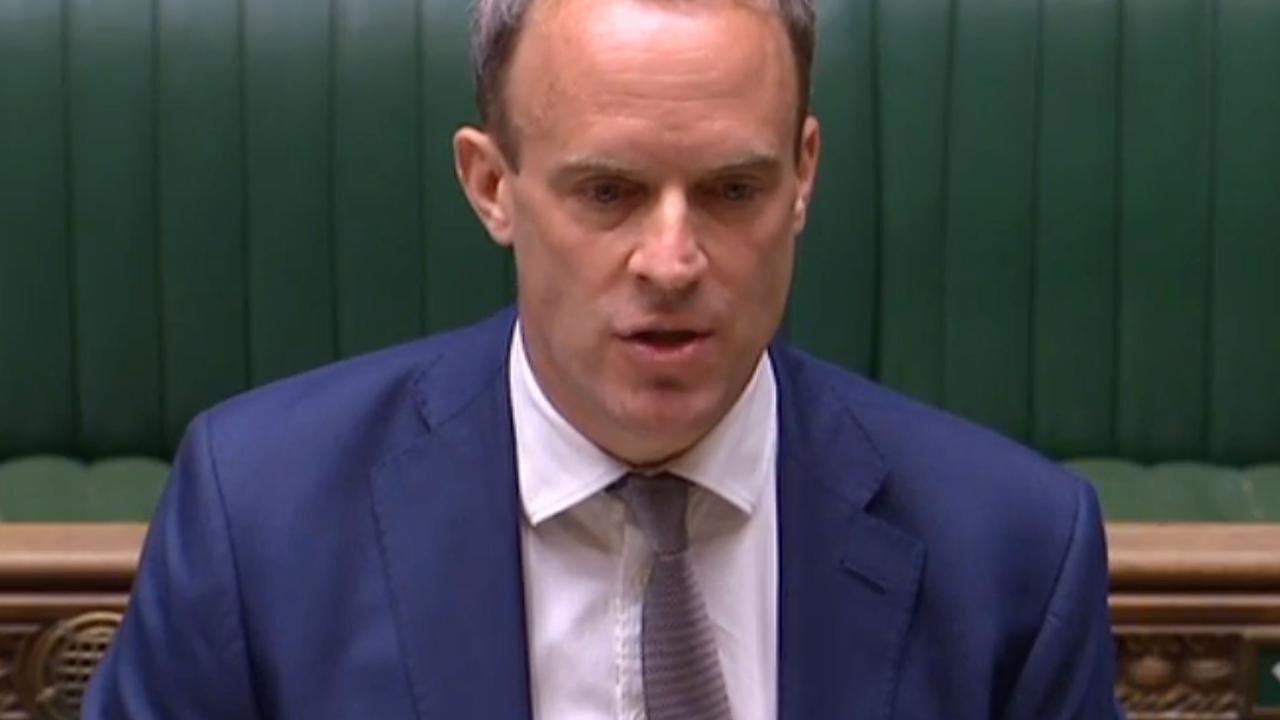World warned to brace for ‘tens of thousands’ of asylum claims as China cracks down on freedoms in Hong Kong
Countries around the world, including Australia, are being warned they should brace for “tens of thousands” of people to flee Hong Kong.
Countries around the world, including Australia, should brace for “tens of thousands” of asylum claims from the people of Hong Kong, a British MP has warned.
China is continuing with its plan to impose a new “national security law” in the territory, which critics say would curtail residents’ political and social freedoms.
It could also constitute a violation of the Joint Declaration agreement signed by Britain and China in 1984, which guarantees Hong Kong political autonomy until 2047 under the “one country, two systems” model.
The law would allow Chinese national security agencies to deploy in Hong Kong for the first time, and to ban “any acts or activities” that threaten China’s national security.
There are fears it could cause a mass exodus from the city.
RELATED: China pushes for new law to further control Hong Kong

Should that happen, much of the pressure to accommodate the fleeing Hong Kong residents will fall on the United Kingdom.
Any residents who were born before British rule of the territory ended in 1997 are eligible for British overseas passports, which allow visa-free access to the UK for up to six months. About 350,000 already hold one.
Prime Minister Boris Johnson recently announced he would make more of these overseas passports available if China kept pressing forward with its plans. It’s estimated 2.5 million people would be eligible to apply.
Mr Johnson signalled he would also extend the visa-free period from six months to 12.
“Many people in Hong Kong fear their way of life, which China pledged to uphold, is under threat,” he said earlier this month, in an article published by The Times.
“If China proceeds to justify their fears, then Britain could not in good conscience shrug our shoulders and walk away. Instead we will honour our obligations and provide an alternative.
“If China imposes its national security law, the British government will change our immigration rules and allow any holder of these passports from Hong Kong to come to the UK for a renewable period of 12 months and be given further immigration rights, including the right to work, which could place them on a route to citizenship.”
But Britain has no intention of shouldering the burden alone, and that is where Australia comes in.
Addressing parliament in early June, UK Foreign Secretary Dominic Raab revealed he had reached out to his counterparts from the other Five Eyes nations – Australia, New Zealand, Canada and the US.
“I raised it on the Five Eyes call yesterday, the possibility of … burden-sharing if we see a mass exodus from Hong Kong,” he said under questioning from former Conservative Party leader Iain Duncan Smith.
“I don’t actually think that is likely … but he (Dunan Smith) is right to raise it, and we’re on the case diplomatically.
“The Australians feel very much that this is in their neighbourhood and their backyard and are taking a very principled point of view.
“They are right up against it. They see all of the impacts of what China is doing, even closer than we do so we work hand-in-glove with them.”

That message was echoed today by one of Mr Raab’s fellow Tory MPs, Bob Seely.
“The more that we can work together to co-ordinate this, the better. And we need to be ready for, potentially, mass asylum for tens of thousands of people coming from Hong Kong,” Mr Seely told the ABC.
“Britain now needs to stand firm in what it’s said. But we need to work together with friends like Australia, and then we can have more impact,” added Benedict Rogers, a British human rights activist and the founder of Hong Kong Watch, which monitors freedoms in the city.
So, what have our own politicians had to say about the situation? In short, they have been broadly supportive of Hong Kong’s pro-democracy protesters.
Late last month, Foreign Minister Marise Payne issued a joint statement with her counterparts from the US, UK and Canada, expressing “deep concern” over China’s push for the national security law.
“China’s decision to impose the new national security law on Hong Kong lies in direct conflict with its international obligations under the principles of the legally binding, UN-registered Sino-British Joint Declaration,” the group said.
“The proposed law would undermine the one country, two systems framework. It also raises the prospect of prosecution in Hong Kong for political crimes.
“As Hong Kong’s stability and prosperity are jeopardised by the new imposition, we call on the government of China to work with the Hong Kong government and the people of Hong Kong to find a mutually acceptable accommodation.”
Others within the Australian government have spoken in support of that position. Backbencher Tim Wilson, for example, addressed the potential flood of asylum claims during an interview with Sky News.
“In terms of how many asylum seekers Australia could take if people apply for asylum, ultimately that has to be considered based on the number of people who apply,” Mr Wilson said.
“I’ve raised this issue internally, previously, about you know, making sure there’s a pathway. And the Minister (Payne) has confirmed that within our existing humanitarian program, we’re more than capable of taking people who fear persecution because of their political beliefs or because of their political action in Hong Kong.”
On the other side of politics, Labor’s Deputy Leader Richard Marles has expressed similar sentiments.
“Certainly, the national security laws that are being proposed by China are of concern. They stand really against the proposition of one country, two systems,” Mr Marles told Insiders.
“I think if, ultimately, there is a call from Britain to Australia, I actually think that is a call we need to take very seriously.
“Ultimately, that is a matter down the track. But I think that the important point here is this – we have an affinity with the people of Hong Kong, and that part of the world, and a long history. We are a country that has and that should continue to play its part when there are matters of humanitarian distress.”


China, for its part, has dismissed the international concerns as “unwarranted foreign interference in Hong Kong’s affairs” and “groundless panic-mongering” that will “only make China more determined” to advance its new law.
On Friday, thousands of Hong Kong residents gathered to sing a protest anthem and chant slogans across the city as they marked the one-year anniversary of major clashes between police and pro-democracy demonstrators.
🎶 “Glory to Hong Kongâ€
— Bloomberg QuickTake (@QuickTake) June 15, 2020
Protesters sing the unofficial Hong Kong anthem at a shopping mall, one year after thousands blocked access to the Legislative Council before debate on the now-withdrawn extradition bill #HongKongProtests #香港 pic.twitter.com/mEtm3sLm2k
Live television showed rallies taking place in half a dozen districts, defying a ban on public gatherings because of the coronavirus outbreak.
A 28-year-old social worker, who gave his surname as So, said anniversaries were a way to keep momentum going, even though crowd sizes at recent protests have been much smaller than last year.
“I came here because our goals have not been achieved, so I have to continue coming out,” Mr So told AFP in Causeway Bay, a popular shopping district.
“We have to tell the government that we won’t give up, no matter how many of us are left.”
Demonstrators are pushing for an inquiry into police brutality, an amnesty for the roughly 9000 people arrested over the protests, and universal suffrage.
China has refused any major concessions, and portrayed the protests as a foreign plot to destabilise the mainland.
Last month it unveiled plans to impose the new national security law, framing it as a way to target subversion, terrorism and foreign interference. Beijing says the law will restore order.
But critics, including many Western governments, fear it will bring mainland-style political oppression to a city supposedly guaranteed freedoms and autonomy.
Originally published as World warned to brace for ‘tens of thousands’ of asylum claims as China cracks down on freedoms in Hong Kong



